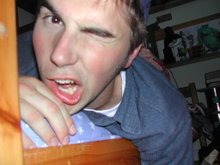Levinas says that each of us encounter others in the world, "others" if you will. These other entities automatically make demands upon us because of their existence in our world. The first demand is "Don't kill me". Are we generally murderous beings that would follow that course of action if not dissauded? Of course not. Perhaps there's more than one way to kill someone. We have our individual sphere of existence that gets intruded upon by others. When this happens, we have the option of understanding those people by their qualities and nothing else. Our friend or acquaintence becomes simply "the girl with brown hair that talks alot" or "my roomate's annoying cousin from Kansas". When we do this, however, we essentially reduce them to non-humans. We are, in a way, killing them. We must see beyond these things and take people as actual people. This is the only way to create real and meaningful relationships. Why don't we? Because treating others as people automatically creates demands upon us. We're unable to retreat into our own little world and focus on ourselves. It's not easy and/or necessarily comfortable. And yet, I think if a lot of people (certainly not all people) really understood, they'd realize that it is in fact what they've been seeking, going about it in entirely the wrong way.
This is why relationships are so important, though. By having someone to make demands upon me we are forced to look beyond ourselves and recognize others as humans. I think this applies to marriage. Does marriage necessarily mean we'll be recognizing our spouse? Nope. We can just classify them away and 'kill' them as easily as not. In addition to this we can (with our spouse) essentially become a single ego and exclude others. We've all met those married people who have nothing else in their universe...not so good. This leads to the importance of children. When we introduce a third, it doesn't just introduce a third person that could conceivably become part of the conglomerate ego we've created, it seems to introduce the idea of other introducing even our partnership. There could be another child, another person at any time. We are opened to the fact that we have to deal with others as people and not simply have a Cartesian life focused on creating our universe and pleasures; we have to deal with the world that surrounds us, a world filled with other things, equipment, enjoyments and most especially, other people.
Tuesday, March 27, 2007
Friday, March 23, 2007
blah blah blah
Oh my goodness. Today through Saturday the conference of the SMTP (Socity for Mormon Philosophy and Theology) is being held at BYU. I attended several of the lectures today and it was an astounding experience. Each of the speakers addressed rather important issues and did so in a very rational manner. The lectures were free of the half-baked ideas you often get in Mormon "philosophy". The best part was that after the lectures there was a Q&A session with the speakers where very intelligent people (both Mormon and not) were able to carry on brilliant conversations. It's like heaven. I'll attend lecures tomorrow from 9:30 to 5:30 and some on Saturday. Brilliant stuff, really.
On another note, I've been thinking alot about the Heideggerian idea of Authenticity. I'm not going to pretend that my idea is what he meant but it is what I've come to see it as in my life. People are generally inauthentic. In any situation they are likely to only do what "one" does in that situation. This is inauthentic. They are not taking a stand on their being as any decent dasein would. When we are inauthentic we take a generalized approach to a situation. For instance, if we are teaching, we teach our classroom in a general way. If we are to approach it authentically, we will take this particular teaching experience and focus on the needs of the students. In general life, it means doing things because you want to do them and not because it's what "one" does. Authenticity doesn't mean morality, it simply means that you are actually directing your own life. Everyone has the capacity for this type of living at least some of the time but it doesn't seem that many take advantage of the opportunity. I suppose it's scary as it requires facing up to responsibility for the quality of our life and the things we do wrong. However, how can you have a rich life without living authentically as much as possible? Seems so empty. I find that talking to someone when they are in inauthentic mode is dissatisfying. But, it's hard to find authentic people. Bit of a conundrum, really.
On another note, I've been thinking alot about the Heideggerian idea of Authenticity. I'm not going to pretend that my idea is what he meant but it is what I've come to see it as in my life. People are generally inauthentic. In any situation they are likely to only do what "one" does in that situation. This is inauthentic. They are not taking a stand on their being as any decent dasein would. When we are inauthentic we take a generalized approach to a situation. For instance, if we are teaching, we teach our classroom in a general way. If we are to approach it authentically, we will take this particular teaching experience and focus on the needs of the students. In general life, it means doing things because you want to do them and not because it's what "one" does. Authenticity doesn't mean morality, it simply means that you are actually directing your own life. Everyone has the capacity for this type of living at least some of the time but it doesn't seem that many take advantage of the opportunity. I suppose it's scary as it requires facing up to responsibility for the quality of our life and the things we do wrong. However, how can you have a rich life without living authentically as much as possible? Seems so empty. I find that talking to someone when they are in inauthentic mode is dissatisfying. But, it's hard to find authentic people. Bit of a conundrum, really.
Friday, March 16, 2007
Guilt and Goodness
Here's an interesting idea: Martin Heidegger seperated the idea of guilt/conscience from morality. He said that each of us live in inauthentic way in relation to the world. We just do whatever one does and don't live authentically. What happens is this leads us to not make real decisions about our lives. Life involves possibilities and we (hopefully) choose a certain way to live. In so doing, however, we choose NOT to do certain things. This can lead to a certain amount of guilt. Our decisions affect people negatively and when we don't make decisions authentically we feel bad doing so.
When people feel this anxiety and guilt about life they try to escape this. They try to escape this by using certain "moral" actions to assuage their feelings of guilt. "If I'm nicer to people I'll feel better". "If I pay my tithing I'll feel better". While these things may be true, Heidegger thinks that it doesn't address the real problem...if we never take a stand on who we are we'll never escape the tendency to hide from the anxiety. We cannot get away from guilt, it is a part of our being. But, if we face up to theat fact and live realizing that we have to make decisions we can at least live authentically and have a rich existence.
At any rate, it's interesting to think that perhaps what we think is escaping from guilt is actually perpetuating the problem and "solving" it in entirely the wrong way.
When people feel this anxiety and guilt about life they try to escape this. They try to escape this by using certain "moral" actions to assuage their feelings of guilt. "If I'm nicer to people I'll feel better". "If I pay my tithing I'll feel better". While these things may be true, Heidegger thinks that it doesn't address the real problem...if we never take a stand on who we are we'll never escape the tendency to hide from the anxiety. We cannot get away from guilt, it is a part of our being. But, if we face up to theat fact and live realizing that we have to make decisions we can at least live authentically and have a rich existence.
At any rate, it's interesting to think that perhaps what we think is escaping from guilt is actually perpetuating the problem and "solving" it in entirely the wrong way.
Monday, March 5, 2007
Chew on this!
This is Richard Polt's explanation of Heidegger's thought on death:
What makes my life my own is ultimately the sheer fact that it is mine to live, mine to make something of, in the face of my possible non-existence. Every other possibility is something that I may be free not to do, and that someone else may be able to do just as well as I can. But my death is a possibility that necessarily faces me alone: no one can face it for me.
I think it's a very interesting thought.
What makes my life my own is ultimately the sheer fact that it is mine to live, mine to make something of, in the face of my possible non-existence. Every other possibility is something that I may be free not to do, and that someone else may be able to do just as well as I can. But my death is a possibility that necessarily faces me alone: no one can face it for me.
I think it's a very interesting thought.
Subscribe to:
Posts (Atom)

